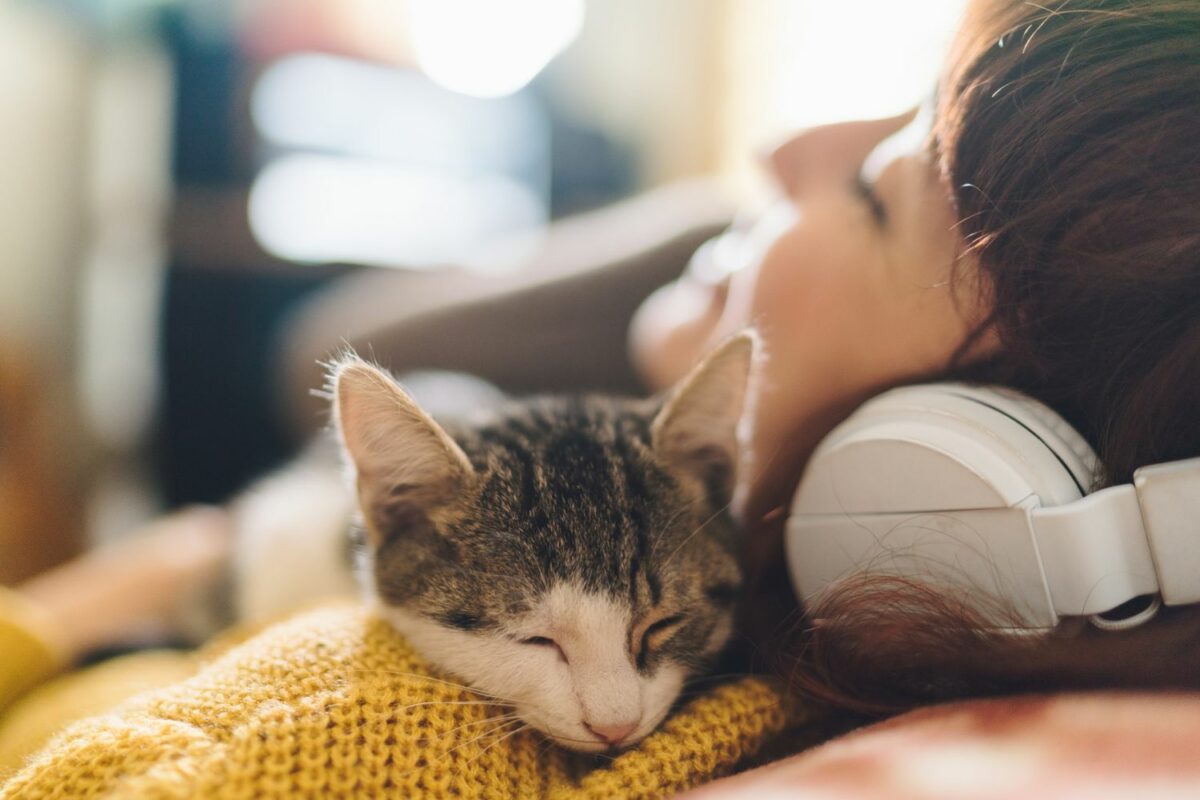
Key Takeaways
- Many people associate sleep music with slower, low-tempo songs, but a new study suggests that upbeat pop songs also work well for some.
- Experts say familiar music can help ease anxiety and distract people from their thoughts.
- Incorporating music into a consistent bedtime routine can also be a good way to improve sleep hygiene.
When thinking about what kind of music might help you enter a deep, restful slumber, there’s a good chance soft, ambient, instrumental music might come to mind—and for good reason.
Previous research suggests that slower, low-tempo music with non-danceable rhythms is most likely to aid with sleep, but a new study offers a different perspective. The study, conducted by researchers at Aarhus University in Denmark, found that more upbeat, catchy pop songs are often featured on playlists that people use to help them fall asleep at night.
The researchers analyzed a total of 225,626 songs from 985 playlists on Spotify that are associated with sleep before separating the tracks into six distinct subcategories.
Three of the subcategories align with the typical characteristics of sleep music: slow, low-tempo, acoustic instruments, no lyrics, etc. The other three subcategories, however, feature music that is faster and higher-energy, including pop songs such as “Dynamite” by BTS—which appeared on the sleep playlists 245 times, the most of any song—and “lovely” by Billie Eilish and Khalid.
“It was surprising to see the degree of variation within the music that people use for sleep,” Kira Vibe Jespersen, PhD, a co-author of the study, told Verywell. “Based on previous studies, we were expecting the music to be from many different genres, but I had not anticipated that much variation in the music characteristics.”
How Can Music Help You Fall Asleep?
According to Michael K. Scullin, PhD, an associate professor of psychology and neuroscience at Baylor University, one of the main reasons music might help someone fall asleep is fairly simple: it can help you relax.
“Music listening could serve as a distraction from internal thoughts and ruminations,” Scullin said. “[It can] fill your head with tunes rather than your worries. Some people also live with roommates or in noisy environments, and playing music could help to mask other noises that would keep someone awake.”
Tana Bao, FNP-BC, an expert in sleep medicine, told Verywell that music is also known to improve anxiety, which greatly impacts sleep.
One 2016 study found that music helped reduce stress and anxiety, and yielded better sleep quality for sleep-disturbed pregnant women. And a 2022 meta-analysis of 21 controlled studies showed that music listening had a significant effect on alleviating anxiety.
“People naturally feel happier when listening to music they enjoy, and these positive feelings subsequently set the stage for a better night’s sleep,” Bao said.
From a sleep hygiene perspective, it’s well established that maintaining a consistent bedtime routine is extremely important, she added, and incorporating music into said routine might help someone sustain their nightly regimen.
Why Does Pop Music Work Better for Some People?
According to the study, while some may argue that music with high energy and danceability would be counterproductive for relaxation and sleep, research shows that the brain is better able to relax when it can predict what’s coming. If someone has heard a song repeatedly, as many people do with pop songs, listening to the track requires minimal focus and energy from the brain.
And if a song is very repetitive, as pop songs tend to be, it is predictable by nature and quickly becomes familiar, which could also facilitate relaxation, the study explains.
“If we think about music helping sleep because it distracts one from internal worries, masks outside noises, or is otherwise a comforting part of the bedtime routine, then it makes sense that one would listen to familiar music at bedtime,” Scullin said.
And, according to Bao, it might also simply come down to personal preference. The kind of music that might relax someone likely has a lot to do with whatever kind of music they genuinely enjoy listening to, she said.
Perhaps this is why studies that have tried to pin down the most effective genre for sleep have resulted in inconsistent findings: An Australian survey found that classical music was the most frequent genre mentioned as a sleep aid, while this new study found pop, ambient, and lo-fi to be the most popular among sleepers—with classical music ranking as the 7th on the list.
But if you’re experiencing insomnia, Scullin said listening to music shouldn’t necessarily be the first trick you try. Instead, it’s best to give stimulus control practices a shot.
“Put simply, only use the bed for sleep,” he said. “Any type of activity that is exciting, stressful, or otherwise counter to drowsiness should be kept to a different room. Smartphones and other technologies are great tools and sources of entertainment, but if you’re having difficulty sleeping, it’s best to keep them out of the bedroom.”
If that doesn’t work, however, you could always try incorporating music you enjoy into a consistent nightly routine.
“Optimizing a sleep routine to help promote a routine at bedtime can, for many, likely be improved by adding music guided by personal preference into the mix,” Bao said.
What This Means For You
If you’re having trouble sleeping at night, you should first try reserving your bed solely for sleep and removing all devices from your room. If that doesn’t work, you could try incorporating familiar music that you enjoy—regardless of genre—into a consistent bedtime routine.